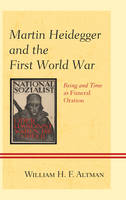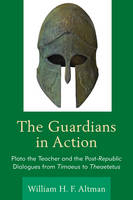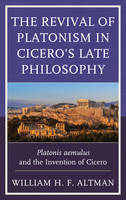Martin Heidegger and the First World War: Being and Time as Funeral OrationAuthor :
Hardback
Published : Thursday 4 October 2012
You may also like ...

by
Hardback
04 Oct 2012
>>
€116.89
Extended stock - Dispatch 5-7 days

by
Hardback
15 Mar 2016
>>
€128.94
Extended stock - Dispatch 5-7 days

by
Hardback
13 Apr 2016
>>
€107.25
Extended stock - Dispatch 5-7 days
Description
In a new approach to a vexing problem in modern philosophy, William H. F. Altman shows that Heidegger's decision to join the Nazis in 1933 can only be understood in the context of his complicated relationship with the Great War.
In a 1934 speech, marking the Twenty-fifth Reunion of his high school class, Martin Heidegger spoke eloquently of classmates killed in the Great War and called on his audience to recognize that the national rebirth now occuring in Hitler's Germany must continue to draw inspiration from the war dead. In this process, he refers to the war of 1914-1918 as the First World War. Since the condition for the possibility of the First is a Second World War, Martin Heidegger and the First World War raises the question: how could Heidegger have already known in 1934 that another war was coming? The answer is to be found by reading Being and Time (1927) as a funeral oration for the warriors of the Great War, a reading that validates Heidegger's paradoxical claim that the genuinely historical must emerge from the future. By using Lincoln's Gettysburg Address as an archetype of the genre, William H. F. Altman shows that Heidegger's concept of temporality in Being and Time replicates the way past, present, and future interweave in the classic funeral oration and argues that if there is a visible path connecting Being and Time to its author's subsequent decision for National Socialism, it runs through the trenches of the Great War and its author's successful attempt to evade them. The analysis and conclusions in this book will be of great value to students and scholars interested in philosophy, history, intellectual history, German studies, and political science.
Reviews